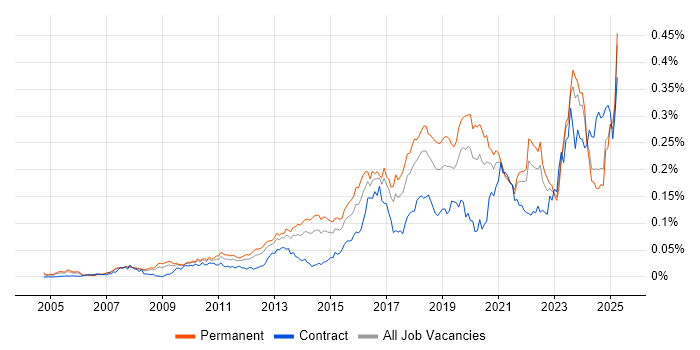Secure Code Development
UK > UK excluding London
The table below provides summary statistics for permanent job vacancies advertised in the UK excluding London requiring Secure Coding skills. It includes a benchmarking guide to the annual salaries offered in vacancies that cited Secure Coding over the 6 months leading up to 5 May 2025, comparing them to the same period in the previous two years.
| 6 months to 5 May 2025 |
Same period 2024 | Same period 2023 | |
|---|---|---|---|
| Rank | 431 | 551 | 696 |
| Rank change year-on-year | +120 | +145 | -13 |
| Permanent jobs citing Secure Coding | 128 | 222 | 66 |
| As % of all permanent jobs advertised in the UK excluding London | 0.34% | 0.32% | 0.11% |
| As % of the Processes & Methodologies category | 0.37% | 0.37% | 0.11% |
| Number of salaries quoted | 65 | 90 | 42 |
| 10th Percentile | - | £45,875 | £41,500 |
| 25th Percentile | £52,500 | £57,500 | £46,250 |
| Median annual salary (50th Percentile) | £55,000 | £70,000 | £57,500 |
| Median % change year-on-year | -21.43% | +21.74% | - |
| 75th Percentile | £65,000 | £84,919 | £84,938 |
| 90th Percentile | £77,250 | - | £91,250 |
| UK median annual salary | £57,500 | £70,000 | £75,000 |
| % change year-on-year | -17.86% | -6.67% | +3.45% |
All Process and Methodology Skills
UK excluding London
Secure Coding falls under the Processes and Methodologies category. For comparison with the information above, the following table provides summary statistics for all permanent job vacancies requiring process or methodology skills in the UK excluding London.
| Permanent vacancies with a requirement for process or methodology skills | 34,632 | 59,361 | 58,643 |
| As % of all permanent jobs advertised in the UK excluding London | 92.41% | 84.34% | 95.63% |
| Number of salaries quoted | 17,835 | 41,086 | 30,132 |
| 10th Percentile | £27,500 | £27,004 | £30,500 |
| 25th Percentile | £38,750 | £36,250 | £40,000 |
| Median annual salary (50th Percentile) | £52,500 | £50,000 | £55,000 |
| Median % change year-on-year | +5.00% | -9.09% | +4.76% |
| 75th Percentile | £66,100 | £65,000 | £70,000 |
| 90th Percentile | £78,750 | £77,500 | £82,500 |
| UK median annual salary | £57,500 | £55,000 | £61,500 |
| % change year-on-year | +4.55% | -10.57% | +2.50% |
Secure Coding
Job Vacancy Trend in the UK excluding London
Job postings citing Secure Coding as a proportion of all IT jobs advertised in the UK excluding London.

Secure Coding
Salary Trend in the UK excluding London
3-month moving average salary quoted in jobs citing Secure Coding in the UK excluding London.
Secure Coding
Salary Histogram in the UK excluding London
Salary distribution for jobs citing Secure Coding in the UK excluding London over the 6 months to 5 May 2025.
Secure Coding
Job Locations in the UK excluding London
The table below looks at the demand and provides a guide to the median salaries quoted in IT jobs citing Secure Coding within the UK excluding London region over the 6 months to 5 May 2025. The 'Rank Change' column provides an indication of the change in demand within each location based on the same 6 month period last year.
| Location | Rank Change on Same Period Last Year |
Matching Permanent IT Job Ads |
Median Salary Past 6 Months |
Median Salary % Change on Same Period Last Year |
Live Jobs |
|---|---|---|---|---|---|
| South East | +120 | 46 | £55,000 | -21.43% | 22 |
| North of England | +22 | 26 | £55,500 | -30.49% | 31 |
| East of England | +65 | 19 | £62,500 | -1.96% | 4 |
| North West | -13 | 19 | £62,500 | +2.11% | 22 |
| South West | +78 | 16 | £55,000 | -18.52% | 24 |
| Midlands | +54 | 12 | £62,500 | -21.72% | 16 |
| Scotland | +123 | 10 | £55,000 | -8.33% | 17 |
| West Midlands | +57 | 10 | £70,000 | -12.33% | 10 |
| Yorkshire | +63 | 6 | £53,375 | -33.15% | 8 |
| East Midlands | +37 | 2 | £55,000 | - | 6 |
| North East | +44 | 1 | £55,000 | -31.11% | 1 |
| Secure Coding UK |
|||||
Secure Coding
Co-occurring Skills and Capabilities in the UK excluding London by Category
The follow tables expand on the table above by listing co-occurrences grouped by category. The same employment type, locality and period is covered with up to 20 co-occurrences shown in each of the following categories:
|
|
||||||||||||||||||||||||||||||||||||||||||||||||||||||||||||||||||||||||||||||||||||||||||||||||||||||||||||||||||||||||||||||
|
|
||||||||||||||||||||||||||||||||||||||||||||||||||||||||||||||||||||||||||||||||||||||||||||||||||||||||||||||||||||||||||||||
|
|
||||||||||||||||||||||||||||||||||||||||||||||||||||||||||||||||||||||||||||||||||||||||||||||||||||||||||||||||||||||||||||||
|
|
||||||||||||||||||||||||||||||||||||||||||||||||||||||||||||||||||||||||||||||||||||||||||||||||||||||||||||||||||||||||||||||
|
|
||||||||||||||||||||||||||||||||||||||||||||||||||||||||||||||||||||||||||||||||||||||||||||||||||||||||||||||||||||||||||||||
|
|
||||||||||||||||||||||||||||||||||||||||||||||||||||||||||||||||||||||||||||||||||||||||||||||||||||||||||||||||||||||||||||||
|
|
||||||||||||||||||||||||||||||||||||||||||||||||||||||||||||||||||||||||||||||||||||||||||||||||||||||||||||||||||||||||||||||
|
|
||||||||||||||||||||||||||||||||||||||||||||||||||||||||||||||||||||||||||||||||||||||||||||||||||||||||||||||||||||||||||||||
|
|||||||||||||||||||||||||||||||||||||||||||||||||||||||||||||||||||||||||||||||||||||||||||||||||||||||||||||||||||||||||||||||
